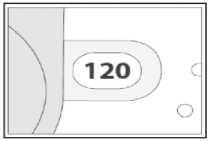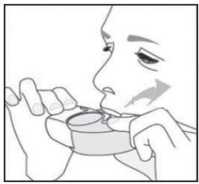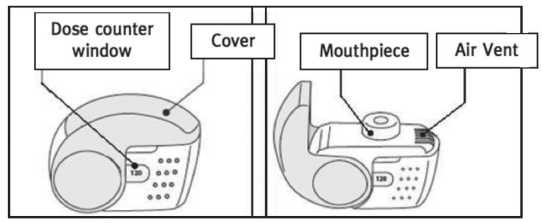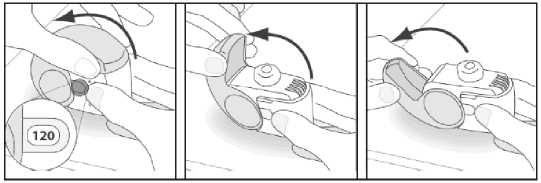Fostair Nexthaler 100 Micrograms/6 Micrograms Per Actuation Inhalation Powder
2729
16.06.16[4]
PATIENT INFORMATION LEAFLET
Fostair ® NEXThaler® 100 micrograms/ 6 micrograms per actuation inhalation powder
(beclometasone dipropionate /formoterol fumarate)
For use in adults
Read all of this leaflet carefully before you start taking this medicine because it contains important information for you.
• Keep this leaflet. You may need to read it again.
• If you have any further questions, ask your doctor, nurse or pharmacist.
• This medicine has been prescribed for you only. Do not pass it on to others. It may harm them, even if their signs of illness are the same as yours.
• If you get any side effects, talk to your doctor, nurse or pharmacist.
This includes any possible side effects not listed in this leaflet.
Your medicine is available using the above name, but will be referred to as Fostair NEXThaler throughout this leaflet.
What is in this leaflet
1. What Fostair NEXThaler is and what it is used for
2. What you need to know before you use Fostair NEXThaler
3. How to use Fostair NEXThaler
4. Possible side effects
5. How to store Fostair NEXThaler
6. Contents of the pack and other information
1. What Fostair NEXThaler is and what it is used for
Fostair NEXThaler is a powder that is inhaled through your mouth and delivered deeply into your lungs. It contains two active ingredients: beclometasone dipropionate anhydrous and formoterol fumarate dihydrate.
• Beclometasone dipropionate anhydrous belongs to a group of medicines commonly referred to as steroids (technically corticosteroids). Steroids both treat and prevent symptoms of asthma. They reduce the inflammation, swelling and irritation in the small air passages of the lungs.
• Formoterol fumarate dihydrate belongs to a group of medicines called long-acting bronchodilators. These relax the muscles in your airways, widening the airways so that it is easier for you to breathe air in and out of your lungs.
These two active substances make breathing easier by providing relief from symptoms such as shortness of breath, wheezing and coughing in patients with asthma or COPD and also help to prevent asthma symptoms.
Asthma:
Fostair NEXThaler is used to treat asthma in adults.
If you are prescribed Fostair NEXThaler it is likely that either:
• Your asthma is not adequately controlled by using inhaled corticosteroids and “as needed” short-acting bronchodilators or
• Your asthma is responding well to both corticosteroids and long-acting bronchodilators.
COPD:
Fostair NEXThaler can also be used to treat the symptoms of severe chronic obstructive pulmonary disease (COPD) in adult patients. COPD is a long term disease of the airways in the lungs which is primarily caused by cigarette smoking.
2. What you need to know before you use Fostair NEXThaler Do not use Fostair NEXThaler
if you are allergic to beclometasone dipropionate anhydrous or formoterol fumarate dihydrate or any of the other ingredients of this medicine (listed in section 6).
Warnings and precautions
Do not use this medicine if you are experiencing acute asthma symptoms such as shortness of breath, wheezing and cough, your asthma is getting worse or you are having an acute asthma attack. To relieve your symptoms you should use your quick-acting “reliever” inhaler which you should carry with you at all times.
Talk to your doctor before using Fostair NEXThaler if you have any of the following:
• heart problems, these include any known disorder of your heart and/or heart function
• disorders of the heart rhythm such as increased or irregular heart rate, a fast pulse rate or palpitations, or if you have been told that your heart trace is abnormal
• high blood pressure
• narrowing of the arteries (also known as arteriosclerosis), or if you know that you have an aneurysm (an abnormal bulging of the blood vessel wall)
• an overactive thyroid gland
• low blood levels of potassium
• any disease of your liver or kidneys
• diabetes. If you inhale high doses of formoterol your blood glucose may increase and therefore you may need to have some additional blood tests to check your blood sugar when you start using this inhaler and from time to time during treatment.
• tumour of the adrenal gland (known as a phaeochromocytoma)
• you are due to have an anaesthetic. Depending on the type of anaesthetic, it may be necessary to stop taking Fostair NEXThaler at least 12 hours before the anaesthesia.
• you are being, or have ever been, treated for tuberculosis (TB) or if you have a known viral or fungal infection of your chest.
If any of the above applies to you, always inform your doctor before you use Fostair NEXThaler.
If you are not sure whether you can use Fostair NEXThaler talk to your doctor, asthma nurse or pharmacist before using the inhaler.
Your doctor may wish to measure the potassium levels in your blood from time to time especially if your asthma is severe.
Like many bronchodilators Fostair NEXThaler can cause a sharp fall in your serum potassium level (hypokalaemia). This is because a lack of oxygen in the blood combined with some other treatments you may be taking together with Fostair NEXThaler can make the fall in potassium level worse.
If you are using an inhaler to take high doses of corticosteroids over a long period of time, you may have more of a need for corticosteroids in situations of stress. Stressful situations might include being taken to hospital after an accident, having a serious injury, or before an operation. In this case, the doctor treating you will decide whether you may need to increase your dose of corticosteroids and may prescribe some steroid tablets or a steroid injection.
Should you need to go to the hospital, remember to take all of your medicines and inhalers with you, including Fostair NEXThaler and any medicines or tablets bought without a prescription, in their original package, if possible.
Children and adolescents
Do not give this medicine to children and adolescents aged less than 18 years.
Other medicines and Fostair NEXThaler
Before starting treatment, please tell your doctor or pharmacist if you are taking or have recently taken any other medicines, including any other inhalers and including medicines obtained without a prescription. This is because Fostair NEXThaler may affect the way some other medicines work. Also, some medicines can affect the way Fostair NEXThaler works.
Do not use beta blockers with this medicine. Beta blockers are medicines used to treat many conditions including heart problems, high blood pressure or glaucoma (increased pressure in the eyes). If you need to use beta blockers (including eye-drops), the effect of formoterol may be reduced or formoterol may not work at all.
Using Fostair NEXThaler when you are taking the following medicines:
|
• other drugs which work in the same way as formoterol (i.e. beta adrenergic drugs, commonly used to treat asthma) |
^ can increase the effects of formoterol. |
|
• quinidine, disopyramide, procainamide (to treat abnormal heart rhythms) • some antihistamines for example terfenadine (to treat allergic reactions) • monoaminoxidase inhibitors or tricyclic antidepressants for example phenelzine, isocarboxazid, amitryptiline and imipramine; phenothiazines (to treat depression or mental disorders) |
can cause changes in the electrocardiogram (ECG, heart trace). They may also increase the risk of disturbances of heart rhythm (ventricular arrhythmias). |
|
• L-dopa (to treat Parkinson's Disease) • L-thyroxine (to treat an underactive thyroid gland) • medicines containing oxytocin (which causes uterine contraction) |
^ can lower your heart's tolerance to beta adrenergic drugs, such as formoterol. |
|
• monoaminoxidase inhibitors (MAOIs) (to treat mental disorders), including drugs with similar properties like furazolidone and procarbazine |
^ can cause a rise in blood pressure. |
|
• digoxin (to treat heart disease) |
^ can cause a fall in your blood potassium level. This may increase the likelihood of abnormal heart rhythms. |
|
• other medicines to treat asthma (theophylline, aminophylline or steroids) • diuretics (water tablets) |
^ can cause a fall in your potassium level. |
|
• some anaesthetics |
^ can increase the risk of abnormal heart rhythms. |
Fostair NEXThaler with alcohol
You should avoid drinking alcohol unless you have talked to your doctor first. Alcohol can lower your heart‘s tolerance to one of the active ingredients of Fostair NEXThaler, formoterol.
Pregnancy and breast feeding
There is no clinical data on the use of Fostair NEXThaler during pregnancy.
If you think you are pregnant or are planning to become pregnant please consult your doctor. You should only use Fostair NEXThaler during pregnancy if you are advised to do so by your doctor.
Your doctor will decide whether you must stop taking Fostair NEXThaler during breastfeeding or you should take Fostair NEXThaler but refrain from breastfeeding. Always follow the advice of your doctor strictly.
Driving and using machines
Fostair NEXThaler is unlikely to affect your ability to drive and use machines. However if you experience side effects such as dizziness and/or trembling, your ability to drive or operate machinery may be affected.
Fostair NEXThaler contains lactose monohydrate
The excipient lactose monohydrate contains small amounts of milk proteins, which may cause reactions in allergic patients.
3. How to use Fostair NEXThaler
Always use Fostair NEXThaler exactly as your doctor has told you. You should check with your doctor, nurse or pharmacist if you are not sure.
Asthma:
Fostair NEXThaler delivers an extrafine aerosol which results in more of each dose being delivered to your lungs. Your doctor may, therefore, prescribe a lower dose of this inhaler than your previous inhalers.
Your doctor will give you a regular check-up to make sure you are taking the correct dose of Fostair NEXThaler. Once your asthma is well controlled your doctor may consider it appropriate to gradually reduce the dose of Fostair NEXThaler. Under no circumstances should you change the dose without first speaking to your doctor.
How much Fostair NEXThaler to use:
Adults and the elderly:
The recommended dose of this medicine is 1 or 2 inhalations twice daily. The maximum daily dose is 4 inhalations.
Do not increase the dose.
If you feel that the medicine is not effective, always talk to your doctor before increasing the dose.
Chronic obstructive pulmonary disease (COPD):
Adults and the elderly:
The recommended dose is two puffs in the morning and two puffs in the evening.
Remember: you should always have your quick-acting “reliever” inhaler with you at all times to treat worsening symptoms of asthma or a sudden asthma attack.
How to use Fostair NEXThaler:
Fostair NEXThaler is for inhalation use.
In this pack, you will find in a sealed protective pouch an inhaler called NEXThaler that contains your medicine in the form of a powder. The NEXThaler inhaler enables you to inhale your medicine.
Please read the instructions at the end of this leaflet for more information about how to use and clean the NEXThaler inhaler.
Whenever possible, stand or sit in an upright position when inhaling.
If you have used more Fostair NEXThaler than you should:
• contact your doctor or nearest hospital casualty department immediately for advice. Take your medicine with you so that the people can see what you have taken;
• side effects may occur. Tell your doctor if you have any unusual symptoms as he/she may wish to carry out further tests or decide about any measures that may be necessary.
If you forget to use Fostair NEXThaler:
Take it as soon as you remember. If it is almost time for your next dose, do not take the dose you have missed, just take the next dose at the correct time. Do not double the dose.
If you stop using Fostair NEXThaler:
Even if you are feeling better, do not stop using Fostair NEXThaler or lower the dose. If you want to do this, talk to your doctor. It is very important for you to use Fostair NEXThaler every day as prescribed by your doctor even though you may have no symptoms.
If your breathing does not change:
If your symptoms do not improve after inhaling Fostair NEXThaler, you may be using it incorrectly. Therefore check the instructions for correct use at the end of this leaflet and/or contact your doctor or nurse to be trained properly again.
If your asthma gets worse:
If your symptoms get worse or are difficult to control (e.g. if you are using your “reliever” inhaler more frequently) or if your “reliever” inhaler does not improve your symptoms, you should continue to use Fostair NEXThaler but go to see your doctor as soon as possible. Your doctor may need to change your dose of Fostair NEXThaler or prescribe an additional or alternative treatment. If you have any further questions on the use of this product, ask your doctor or pharmacist.
4. Possible side effects
Like all medicines, this medicine can cause side effects, although not everybody gets them.
As with other inhaler treatments there is a risk of worsening shortness of breath, cough and wheezing immediately after using Fostair NEXThaler and this is known as paradoxical bronchospasm. If this occurs you should STOP using Fostair NEXThaler immediately and use your quick-acting “reliever” inhaler straightaway to treat the symptoms.
You should contact your doctor straightaway.
Tell your doctor immediately if you experience allergic reactions which include skin allergies, skin itching, skin rash, reddening of the skin, swelling of the skin or of mucous membranes especially of the eyes, face, lips and throat.
Other possible side effects of Fostair NEXThaler are listed below according to their frequency.
You should contact your doctor or pharmacist immediately:
• if you experience any of the side effects below and they cause you distress, are severe or last for several days
• if you are worried in any way or if there is anything you do not understand.
Your doctor is likely to assess your asthma and if necessary start you on another course of treatment. You may be told that you should not use Fostair NEXThaler again.
Common (may affect up to 1 in 10 people):
• trembling.
Uncommon (may affect up to 1 in 100 people):
• cold-like symptoms, sore throat
• fungal infections (of the mouth and throat). Rinsing your mouth or gargling with water and brushing your teeth immediately after inhalation may help to prevent these side effects.
• worsening of your asthma symptoms, difficulty breathing
• hoarseness
• cough
• unusually fast heart beat
• unusually slow heart beat
• crushing chest pain
• headache
• feeling sick
• feeling tired or nervous
• changes in the electrocardiogram (ECG)
• low level of cortisol in your urine or in your blood
• high level of potassium in your blood
• high level of glucose in your blood
• high level of fats in your blood.
Side effects which have been observed with similar medicines for inhalation containing beclometasone dipropionate and/or formoterol are:
• palpitations
• uneven heart beat
• abnormal or impaired sense of taste
• muscle pain and muscle cramps
• restlessness, dizziness
• feeling anxious
• sleep disorders
• a fall in the level of potassium in the blood.
• increase/decrease of blood pressure
POM
PL 20636/2729


Pneumonia: Tell your doctor if you notice any of the following symptoms: increase in sputum production, increase in sputum colour, fever, increasing cough, increased breathing problems.
Using high-dose inhaled corticosteroids over a long time can cause systemic effects these include:
• problems with how your adrenal glands work (adrenosuppression)
• thinning of the bones
• growth retardation in children and adolescents
• increased pressure in your eyes (called glaucoma), cataracts
• rapid weight gain, particularly of the face and torso
• sleeping problems, depression or feeling worried, restless, nervous, over-excited or irritable. These effects are more likely to occur in children.
• abnormal behaviour.
Reporting of side effects
If you get any side effects, talk to your doctor, pharmacist or nurse. This includes any possible side effects not listed in this leaflet. You can also report side effects directly via the Yellow Card Scheme at www.mhra.gov.uk/yellowcard. By reporting side effects you can help provide more information on the safety of this medicine.
5. How to store Fostair NEXThaler
Keep this medicine out of the sight and reach of children.
Do not use this medicine after the expiry date which is stated on the carton, pouch and label after Exp. The expiry date refers to the last day of that month.
Store in the original package in order to protect from moisture. Only remove the inhaler from its pouch immediately before first use.
Before first opening the pouch:
This medicinal product does not require any special temperature storage conditions.
After first opening the pouch:
Do not store above 25°C.
After first opening the pouch, the medicinal product should be used within 6 months. Use the label on the box to write down the date you open the pouch.
If your inhaler fails to work properly or shows any signs of deterioration, you should seek the advice of your pharmacist.
Do not throw away any medicines via wastewater or household waste.
Ask your pharmacist how to throw away medicines you no longer use. These measures will help to protect the environment.
Please read the instructions at the end of this leaflet for more information about how to store the NEXThaler inhaler.
6. Contents of the pack and other information What Fostair NEXThaler contains:
The active substances are: beclometasone dipropionate anhydrous and formoterol fumarate dihydrate.
Each metered dose contains 100 micrograms of beclometasone dipropionate anhydrous and 6 micrograms of formoterol fumarate dihydrate. This corresponds to a delivered dose from the mouthpiece of 81.9 micrograms of beclometasone dipropionate anhydrous and 5 micrograms of formoterol fumarate dihydrate.
The other ingredients are: lactose monohydrate (which contains small amounts of milk proteins) and magnesium stearate.
What Fostair NEXThaler looks like and contents of the pack
This medicinal product is presented as a white to almost white inhalation powder contained in a plastic inhaler called NEXThaler.
NEXThaler is a multi-dose inhalation device. The device consists of a white lower shell with dose counter and integral pink cover.
Each pack contains one inhaler which provide 120 inhalations.
Each inhaler comes in a sealed protective pouch (aluminium foil package).
Manufacturer and Product Licence holder:
Manufactured by
Chiesi Farmaceutici S.p.A., Via San Leonardo 96, 43122 Parma, Italy
Chiesi S.A., Rue Faraday, ZA des Gailletrous, 41260 La Chaussee Saint Victor, France.
Chiesi Pharmaceuticals GmbH, Gonzagagasse, 1010 Vienna, Austria.
Procured from within the EU by Product Licence holder
Star Pharmaceuticals Ltd, 5 Sandridge Close, Harrow, Middlesex,
HA1 1XD. Repackaged by Servipharm Ltd.
Leaflet revision and issue date (Ref.) 16.06.16[4]
Fostair and NEXThaler are trademarks of Chiesi Farmaceutici S.p.A.
INSTRUCTIONS FOR USE OF NEXThaler INHALER
Please read all of the following instructions before you start using this inhaler.
If you experience any problems using this inhaler, please contact your doctor, nurse or pharmacist.
A. Contents of the Package
This package contains:
• 1 instruction leaflet
• 1 NEXThaler inhaler inside the sealed protective pouch.
If the package contents are not the same as this, return your inhaler to the person who supplied it (e.g. pharmacist or doctor) and get a new one.
B. General Warnings & Precautions
• Do not remove the inhaler from the pouch if you do not intend to use it immediately.
• Only use your inhaler as indicated.
• If you are not sure you are receiving your dose correctly contact your pharmacist or doctor.
• If you are not sure the dose counter has gone down by one after inhalation, wait until your next scheduled dose and take this as normal. Do not take an extra dose.
• Keep the cover closed until you need to take a dose from your inhaler.
• When you are not using your inhaler keep it in a clean and dry place.
• Do not attempt to take your NEXThaler inhaler apart for any reason.
• Do not use your NEXThaler inhaler:
• after its expiry date
• if it is more than 6 months since you opened the pouch
• if it is broken
• if the dose counter window shows “0”
• if you cannot read the dose counter window.
In these cases, dispose of your inhaler, or return it to the person who supplied it, and get a new one.
Ask your pharmacist how to dispose of inhalers no longer required.
C. Key features of your NEXThaler inhaler

Taking a dose from your NEXThaler inhaler requires just three simple steps: Open, Inhale, Close.
D. Before using a new NEXThaler inhaler
1. Open the pouch and take out your inhaler.
• Do not use your inhaler if the pouch is not sealed or it is damaged return it to the person who supplied it and get a new one.
2. Inspect your inhaler.
• If your inhaler looks broken or damaged, return it to the person who supplied it and get a new one.
3. Check the Dose Counter Window. If your inhaler is brand new
you will see “120” in the Dose Counter Window.
• Do not use a new inhaler if the number shown is less than “120” -return it to the person who supplied it and get a new one.
E. How to use your NEXThaler inhaler E.1. Visual Check
1. Check the number of doses left: any number between “1 ” and “120” shows that there are doses left.
• If the Dose Counter Window shows “0” there are no doses left -dispose of your inhaler and get a new one.
2. Make sure the cover is fully closed before you use it.
E.2. Open
1. Hold your inhaler firmly in the upright position.
3. Remove your inhaler from your mouth.
4. Hold your breath for 5 to 10 seconds or as long as is comfortable.
5. Breathe out slowly.
• Do not breathe out through your inhaler.
E.4. Close
1. Move your inhaler back to the upright position and close the cover fully.
2. Check that the dose counter has gone down by one.

3. If you need to take another dose, repeat steps E.1 to E.4.
F. Cleaning
• Normally, it is not necessary to clean your inhaler.
• If necessary you may clean your inhaler after use with a dry cloth or tissue.
• Do not clean your inhaler with water or other liquids. Keep it dry.
G. Storage
• When you are not using your inhaler keep it in a clean dry place. You may put it back in the pouch after use.
• Do not expose your inhaler to heat or direct sunlight.
• Do not expose your inhaler to a humid or wet environment.
• Keep out of the sight and reach of children.
• If your inhaler has been stored for over 6 months since you opened the pouch, dispose of it and get a new one.
H. Disposal
• Dispose of your NEXThaler inhaler if the number shown in the dose counter window is “0”.
• Ask your pharmacist what to do with medicines you have finished or do not need.
• Do not dispose of medicines with your regular household waste.
2. Open the cover fully.

3. Before inhaling breathe out as far as is comfortable.
• Do not breathe out through your inhaler.
E.3. Inhale
Whenever possible, stand or sit in an upright position when inhaling.
1. Lift your inhaler up, bring it to your mouth and place your lips around the mouthpiece.
• Do not cover the air vent when holding your inhaler.
• Do not inhale through the air vent.
2. Take a quick and deep breath through your mouth.
• You may notice a taste when you take your dose.
• You may hear or feel a click when you take your dose.
• Do not inhale through your nose.
• Do not remove your inhaler from your lips during the inhalation.